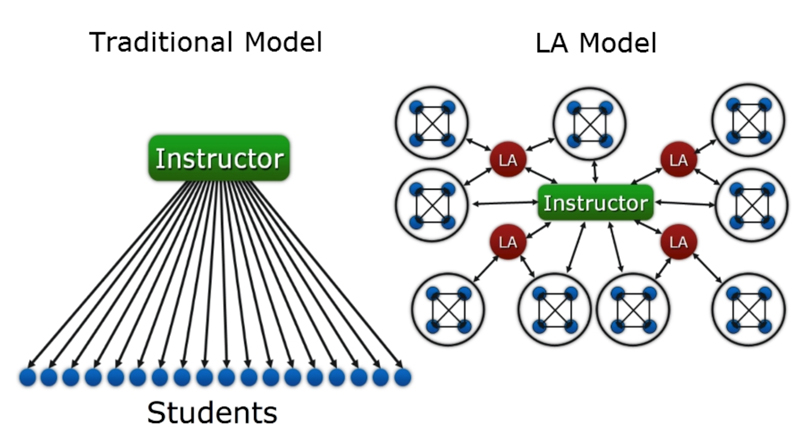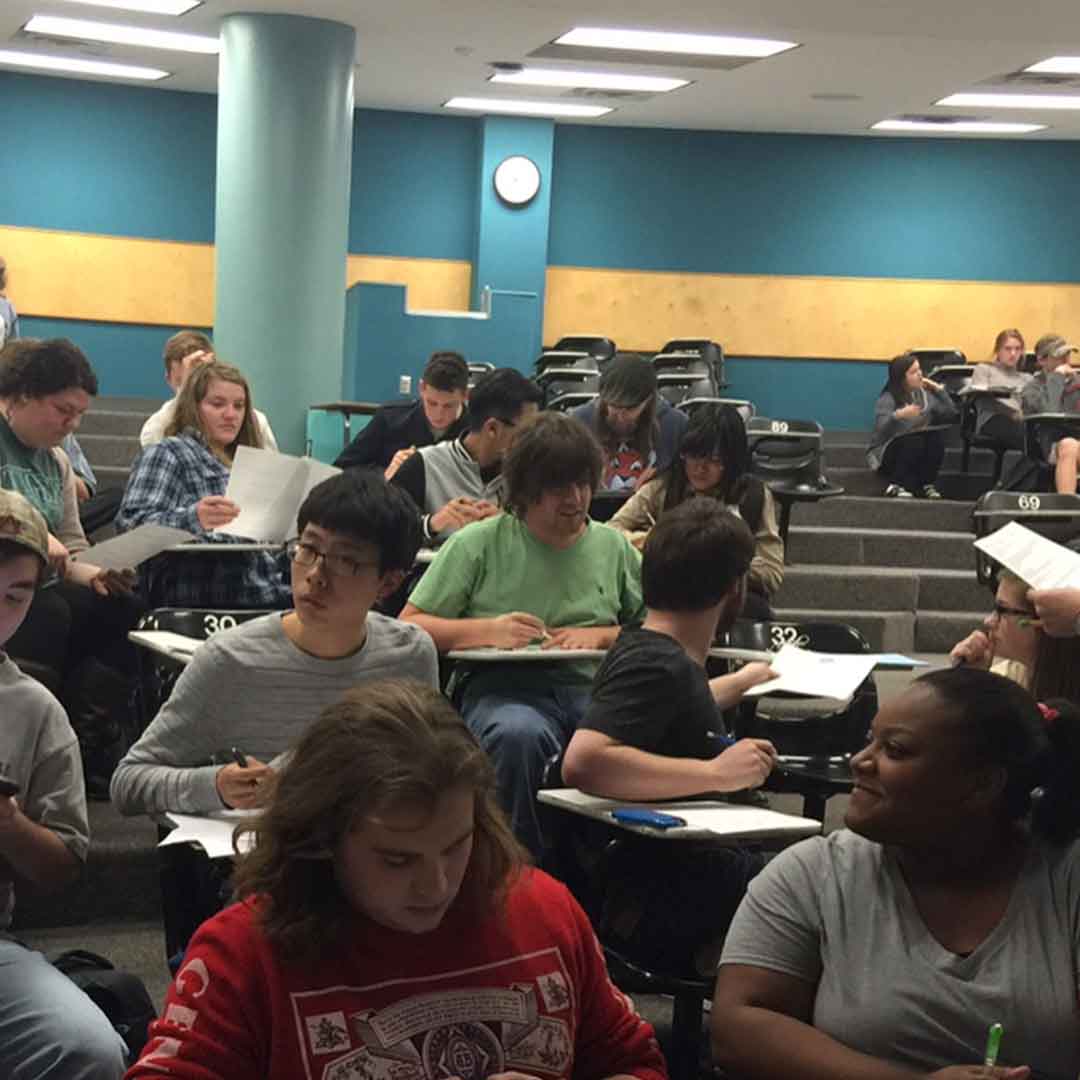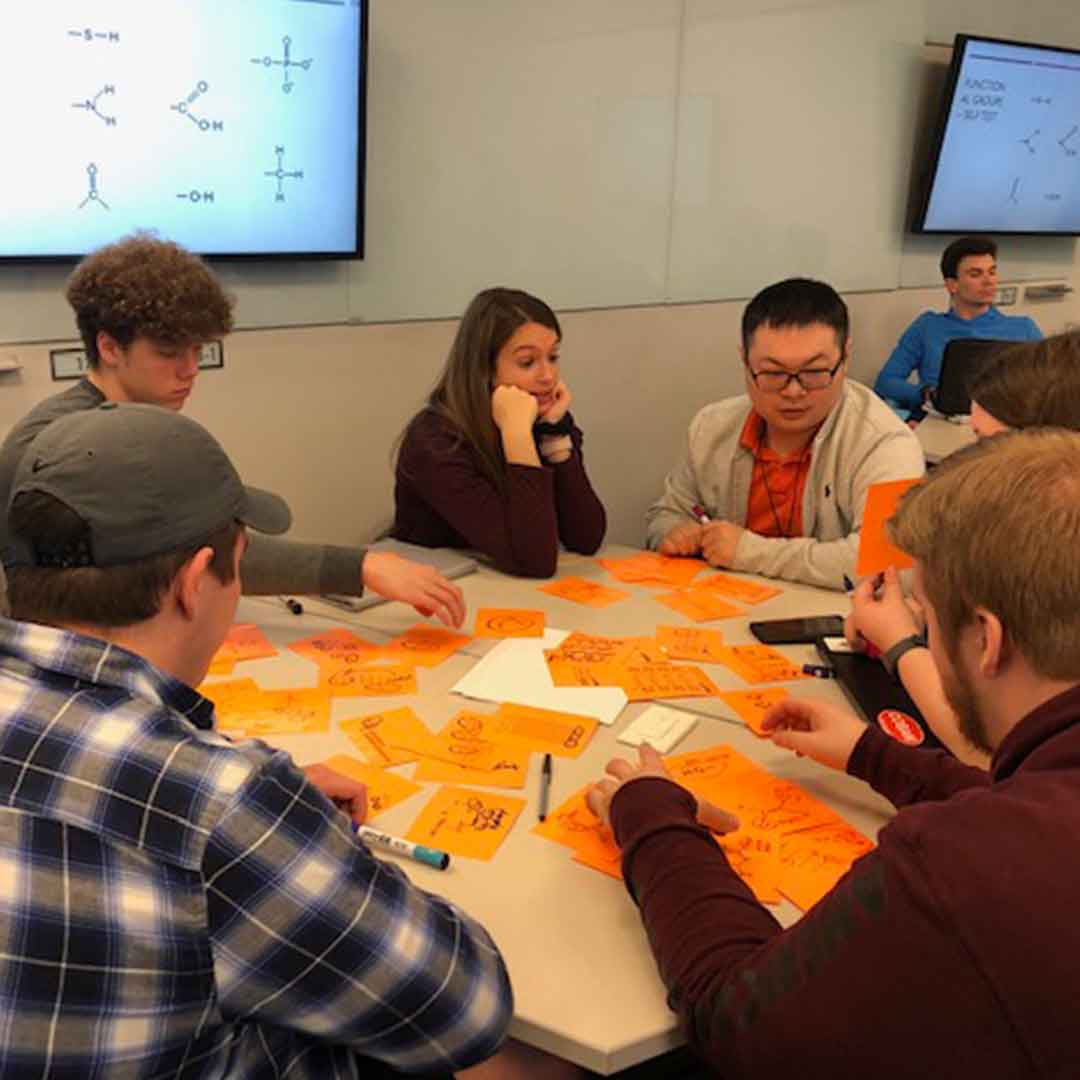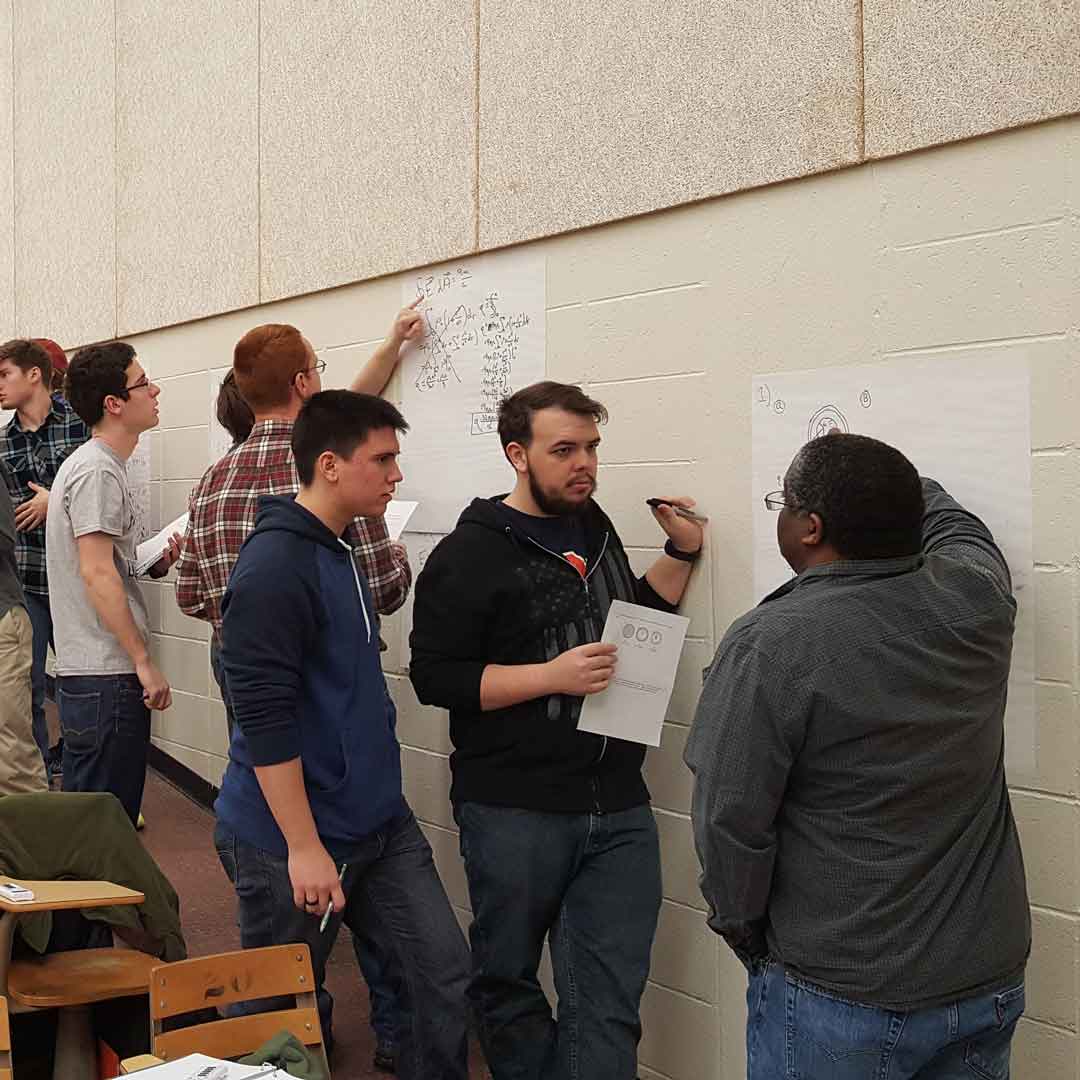What is a Learning Assistant?
Learning Assistants are undergraduate students who, through the guidance of weekly preparation sessions and a pedagogy course, facilitate discussions among groups of students in a variety of classroom settings that encourage active engagement. They are peers of the current students who have successfully passed the course within the past year.
Auburn University Learning Assistant Program
Auburn University Learning Assistant Program (AULAP) formally began in Fall 2015. It is modeled after the UC Boulder LA Program. The program is currently funded by COSAM and partnership with Biggio center. Currently participating units are Physics, Chemistry, Biology and Geoscience with others coming soon. AULAP is an active participant with the national Learning Assistant Alliance.
The program provides an enhanced learning support for undergraduates enrolled in science and math courses with active learning settings. LAs offer a big psychological advantage in difficult courses like physics, especially to non-majors. They serve a critical role as dedicated and skilled facilitators to facilitate active learning and collaborative instruction in large lecture, discussion and/or lab.
Overall Purpose
The COSAM Learning Assistant (LA) Program aims to support active learning activities in courses offered by the College of Sciences and Mathematics (COSAM). By engaging learning assistants, faculty members, and students, the program fosters an interactive environment conducive to academic success.
-
Curriculum and course transformation:
The LA Model supports course transformation into active student learning. -
Discipline-based education research:
The LA Model introduces and supports conversations between faculty about education research and its role in creating effective learning spaces. -
Institutional change:
The LA model acts as a change agent in faculty, departments, and institutional practices by providing infrastructure to support and reward instructional innovation. -
Teacher recruitment and preparation:
The LA model is an effective method of recruitment and preparation for future K-12 teachers. It can both provide exposure and generate interest to undergraduates who had never thought of teaching as a career before and help those who are on the fence decide if teaching is right for them. Meanwhile, the LA program emphasizes “best practices” and provides diverse student support which are helpful for students at any level
The Learning Assistant Model

LA Pedagogy Course
The LA pedagogy course is mandatory for new or first-time LAs. There are no alternatives or exceptions. Once completed, LAs are certified and do not need to take the course again.
The course is SCMH 4700 - Pedagogy of Peer-Led Instruction.
The pedagogy course introduces LAs to educational research, active learning, and strategies that support:
(1) eliciting student ideas and helping all group members become active and engaged in the class;
(2) listening and questioning;
(3) building relationships; and
(4) integrating learning theories with effective practices.
In the pedagogy course, LAs read articles from the education literature both specific to their disciplines and more general, they engage in discussions about their experiences with students and how this relates to the literature, and they complete assignments including weekly online teaching reflections, interview-based investigations into students’ current ways of thinking about a topic, they design interventions to assist students with topics or skills that are found to be difficult for students, and they solicit mid-semester evaluations of their teaching.
The purpose and goals of the LA pedagogy course are given below. Typical semester calendars with topics are provided on the next page and this is followed by several pages that describe the various out-of-class assignments for the course. The remainder of the Pedagogy Course section includes descriptions of each pedagogy course session and tips for running each session.
Purpose of the LA Pedagogy Course
-
To have new LAs reflect on their own teaching and learning and make connections to relevant education theory and literature.
-
To support and prepare LAs to interact with students, question students according to class topic, make claims about students’ ideas, and take action as a result. Ideally, to help students interact with one another.
-
To inspire and motivate LAs to recognize and exercise their capabilities and responsibilities for making the world a better place.
-
To provide a community for new LAs to discuss their roles and experiences working with students and faculty
The Pedagogy Course Goals are for LAs to:
-
Reflect on their own teaching and learning
-
Reflect on and develop their views on teaching and learning
-
Make connections to relevant education theory and literature and share this with their lead faculty member.
-
Try out a variety of strategies in their learning teams and revise these strategies according to their experience.
-
Listen to their students, make claims about their students’ ideas, and take action to address those claims (formative assessment).
-
Develop awareness of the intellectual, social, cultural diversity of students and begin thinking about differentiate instruction.
-
Begin thinking about the ways in which they would like to see change, and begin to see themselves as influencing this process.
-
Discuss their roles and experiences working with students and faculty.
LA-supported Courses at Auburn
There are 6 physics courses, 7 biology courses, and 7 chemistry courses supported by the LA program, serving over 10,000 undergraduate students each year. Most are service courses for majors, non-majors and honors with large enrollments.

Biology
BIOL 1000 – Introduction to Biology
BIOL 1020 – Principles of Biology (multiple sections)
BIOL 1030 – Organismal Biology (multiple sections)
BIOL 3200 – General Microbiology (multiple sections)
BIOL 2500 – Human Anatomy and Physiology I
BIOL 3000 – Genetics
BIOL 4100 – Cell Biology
BIOL 5500 – Immunology
BIOL 5200 – Clinical Microbiology

Chemistry
CHEM 1020 – Survey of Chemistry II
CHEM 1030 – Fundamentals of Chemistry I (multiple sections)
CHEM 1040 – Fundamental Chemistry II (multiple sections)
CHEM 1120 – General Chemistry for Scientists and Engineers II
CHEM 1127 – Honors General Chemistry II
CHEM 2030 – Survey of Organic Chemistry
CHEM 2070 – Organic Chemistry I
CHEM 2080 – Organic Chemistry II (multiple sections)
BCHE 5180 – Biochemistry I
BCHE 5190 – Biochemistry II

Physics
PHYS 1500 – General Physics I
PHYS 1510 – General Physics II
PHYS 1600 – Engineering Physics I (multiple sections)
PHYS 1610 – Engineering Physics II
PHYS 1607 – Honors Physics I
PHYS 1617 – Honors Physics II
Geosciences
GEOL 1010 – Global Geology
GEOG 1030 – Global Sytems: Land and Water
GEOL 1110 – Earth & Life Through Time
GEOL 2100 – Environmental Geology
GEOL 2020 – Physical Geography
People
| Office of Academic Affairs: |
|
| Biological Sciences: |
|
|
Geosciences: |
|
|
Mathematics and Statistics: |
|
| Physics: |
|
| Chemistry and Biochemistry: |
|
For additional information specific to departments, please contact the departmental LA coordinators.
Resources
If you are interested in more information about other Learning Assistant Programs, visit the international Learning Assistance Alliance and the LA Program at University of Colorado, Boulder where the LA model was first developed in 2003.

